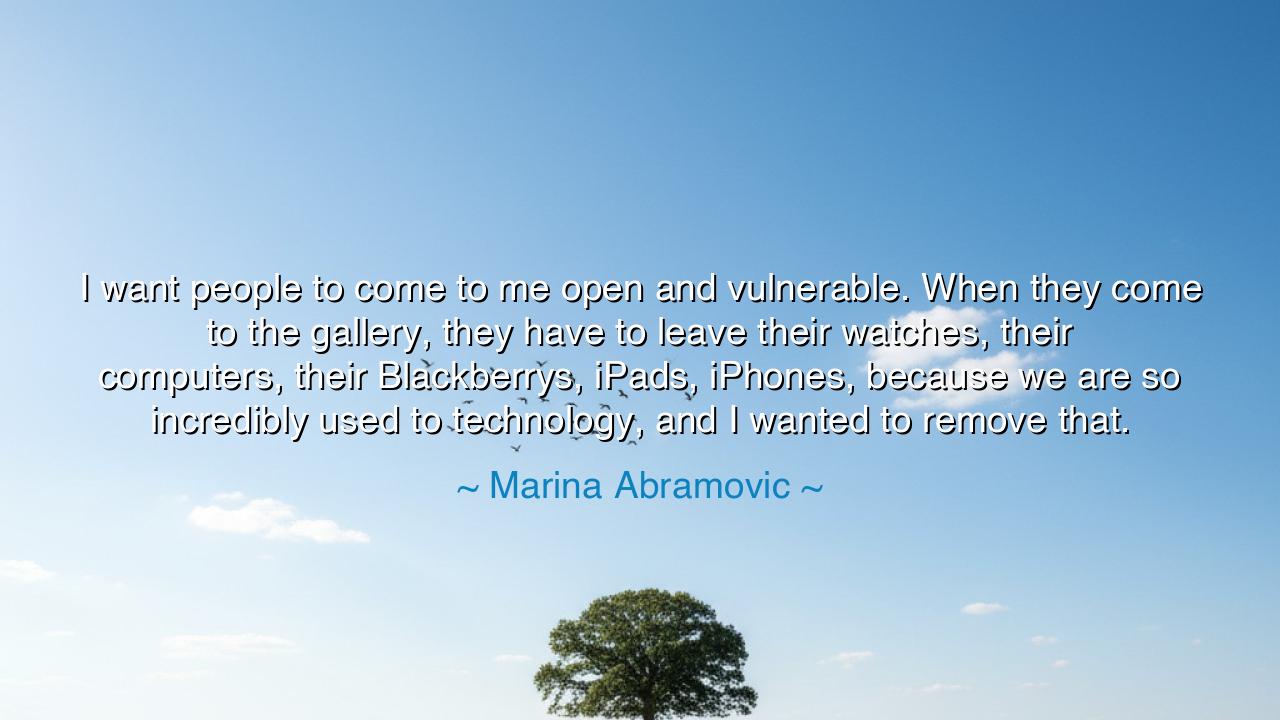
I want people to come to me open and vulnerable. When they come
I want people to come to me open and vulnerable. When they come to the gallery, they have to leave their watches, their computers, their Blackberrys, iPads, iPhones, because we are so incredibly used to technology, and I wanted to remove that.






In the haunting and profound words of Marina Abramović, the great priestess of performance art, we hear a cry that pierces through the noise of the modern world: “I want people to come to me open and vulnerable. When they come to the gallery, they have to leave their watches, their computers, their Blackberrys, iPads, iPhones, because we are so incredibly used to technology, and I wanted to remove that.” These words are not merely the command of an artist — they are the invocation of a seeker who longs to restore humanity to its original essence. In them, Abramović calls upon us to cast off the armor of distraction and to return, even for a moment, to the nakedness of being.
In the age of the ancients, men and women sought communion not through screens, but through presence — the meeting of eyes, the silence between words, the sacred rhythm of breath and heart. The temple was a place where all worldly possessions were left behind before entering the inner sanctum, for to meet the divine, one had to be bare, unshielded by gold, status, or noise. In her own way, Abramović recreates this ancient ritual within the walls of her gallery. She demands not spectators, but participants — not passive consumers of art, but souls willing to stand without the protection of time or technology. To step into her presence is to step into the old ways of seeing, where the mirror is not glass but human gaze, and the reflection is the soul itself.
The origin of this quote comes from Abramović’s deep commitment to presence as the purest art form. Her works, such as The Artist Is Present, invite not the intellect, but the essence of being. In that legendary performance, she sat motionless for hours, days, weeks — her only act was to be. Those who came before her, stripped of their devices and schedules, were forced into the unfamiliar silence of the moment. Many wept. Some trembled. Others smiled as if touched by something divine. What she removed was not technology alone, but the veil that separates us from our own humanity. Her words remind us that in our pursuit of progress, we have chained ourselves to constant motion — and in doing so, forgotten the stillness that births meaning.
Consider the tale of Diogenes, the philosopher who lived in simplicity, carrying a lantern in daylight, claiming to search for an honest man. When asked why he owned nothing, he replied that freedom was found only in detachment. Abramović’s demand that her visitors surrender their devices is a modern echo of this ancient wisdom. She too searches for the honest man, the unmasked human, uncluttered by the hum of machines and the tyranny of time. For in the glow of a screen, the soul dims; in silence and stillness, it awakens.
Her insistence on vulnerability is not cruelty but compassion. In a world obsessed with perfection and control, to be vulnerable is the most radical act of all. It is to admit our need for connection, our hunger for meaning, our fear of being unseen. When we set aside our devices, we set aside our masks — and what remains is truth. Abramović does not wish to entertain; she wishes to reveal. Her gallery becomes a sanctuary where technology’s constant hum falls silent, and what is left is the trembling heart of human presence — raw, unguarded, and real.
From her words, we may draw a timeless lesson: technology must serve humanity, not consume it. The tools of progress should enhance our awareness, not numb it. To reclaim our wholeness, we must learn the discipline of disconnection. Let there be hours in the day when no screen glows before our eyes. Let there be spaces — in art, in conversation, in nature — where silence reigns, and the only signal we seek is the one from within. To “leave our watches and devices” is not to reject the world, but to rediscover it.
And so, remember this teaching, O listener: the deepest truths cannot be transmitted through fiber or code — they must be felt, face to face, soul to soul. When you next enter a space of meaning — a gallery, a temple, a moment of love — leave behind your instruments of distraction. Enter as the ancients did: empty-handed but full-hearted. For only in the absence of noise can you hear the whisper of eternity. As Marina Abramović reminds us, when we remove the devices that divide us, we do not lose the world — we regain ourselves.
Thus, let this be your practice: to be open, to be vulnerable, to be present. Turn from the glow of the screen to the glow of life itself. Look upon another’s face and see not data, but depth. Sit in silence and feel the pulse of your own being. In that stillness, you will find what the ancients called truth — and what Marina Abramović, in her wisdom, has rediscovered: that the most sacred act in our time is to simply, courageously, be human.






AAdministratorAdministrator
Welcome, honored guests. Please leave a comment, we will respond soon